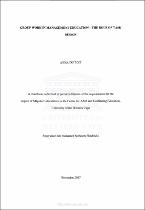| dc.contributor.advisor | Hendricks, Mohamed Natheem | |
| dc.contributor.author | Du Toit, Anna | |
| dc.date.accessioned | 2023-03-09T07:56:55Z | |
| dc.date.available | 2023-03-09T07:56:55Z | |
| dc.date.issued | 2007 | |
| dc.identifier.uri | http://hdl.handle.net/11394/9737 | |
| dc.description | Magister Educationis (Adult Learning and Global Change) - MEd(AL) | en_US |
| dc.description.abstract | This minithesis examines adult learners' experiences of group work in management education. Group work is an integral part of learning and teaching methods at most business schools because it develops team skills demanded by today's workplace. Furthermore, group work in education is grounded in the belief that much learning happens through social interaction and that diversity within groups promotes learning. At a more practical level, group work makes large projects feasible. Learners view group work as beneficial. But their experiences also reflect that it is often associated with problems. The main problems reported relate to unequal participation and group conflict. Underpinning the study is the recognition of the key role of social interaction in learning. This study analyses learners' group experiences
in a business school. The study aims to identify conditions that hinder and promote group interaction with a view to enhance learning.
Through questionnaires and interviews the study obtains an overview of the experiences of 45 adult learners on a one-year management programme at a business school in South Africa in relation to two group assignments. Questionnaires are also used to obtain the views of the two educators who designed the two group assignments. The study includes an analysis of the two group assignment briefs. The study found that non-participation or 'free-riding' and the sub-division of group tasks occurred frequently. The design of the group tasks promoted sub-division and non-participation, which in turn gave rise to tension and conflict. Learning objectives were unclear as the purpose of group work in the learning process was not communicated to students. The tasks did not demand much group interaction or learner interdependency which meant that tasks could be split up and done individually or by part of the group. This reduces the opportunity for group collaboration to clarify understandings and create shared meaning, which in turn negatively impacts on individual learning. The study argues that successful group work requires careful task design. To realise its full potential certain conditions must be met. Learners need to know that the group process is an integral part of their learning, group work must be integrated into overall course design and assessment, tasks must demand a high degree of interaction, learners need to be interdependent, and groups need support throughout the process. | en_US |
| dc.language.iso | en | en_US |
| dc.publisher | University of the Western Cape | en_US |
| dc.subject | Management education | en_US |
| dc.subject | Adult learning | en_US |
| dc.subject | Cooperative learning | en_US |
| dc.subject | Group work | en_US |
| dc.subject | Group dynamics | en_US |
| dc.subject | Group assignments | en_US |
| dc.subject | Interaction | en_US |
| dc.subject | Individual participation | en_US |
| dc.subject | Assessment | en_US |
| dc.subject | Interdependence | en_US |
| dc.subject | Individual accountability | en_US |
| dc.title | Group work in management education - The role of task design | en_US |
| dc.rights.holder | University of the Western Cape | en_US |

